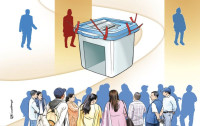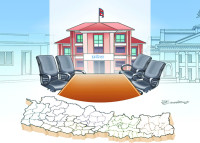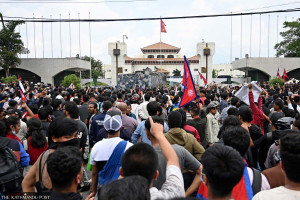Opinion
Contempt of whom?
Unless the Supreme Court protects the freedom of speech, it will fail to uphold its own dignity.
Prakash Bom
Court remedies
Contempt proceedings in the world’s most democratic courts are meant to enforce equitable remedies, such as injunction—a judicial order restraining a person from invading the legal right of another. This means, under the laws and rules governing contempt of court, the court on the one hand protects the court authorities—judges and attorneys and court proceedings—from rude and disgraceful disturbances. On the other, it enforces the law against a willful failure to obey an order of the court. However, it is up to the court to deliver equitable justice in order to uphold the dignity of the court so that public trust remains unbroken.
According to the Asian Human Rights Commission (AHRC), the contempt of court bill that the Nepal government tabled in Parliament on June 9 to uphold judicial dignity restricts the freedom of expression and freedom of the press. It curtails individual freedoms enshrined in Article 19 of the Universal Declaration of Human Rights because the proposed bill’s terms, such as ‘defamatory’, ‘malicious’, ‘false’, and ‘confusing’ to define contempt of court, are ambiguous and can allow the court to arbitrarily interpret and misuse the terms.
Court premises only
The standard contempt of court practice in all democratic court systems is that laws and rules cannot be forced upon individuals for upholding judicial dignity. But it is the court and its proceedings that can uphold the dignity and public trust in the institution. That is to say, laws and rules are applied exclusively during court proceedings but are not intended to impose restrictions on individuals prior to court proceedings of a particular case within the premise of the court. This means laws and rules governing contempt of court in terms and meaning cannot be all-encompassing because their objective is to run court proceedings and keep court order intact.
For instance, if an individual or a media house does not agree with the verdict of the court on a particular case, particular law or a proposed bill in Parliament, they can express their thoughts against it and should not be restricted in any way because they are not bound by the laws and rules of contempt of court outside of court premises. A recent verdict by the Supreme Court of the United States of America on the ‘Hobby Lobby’ case against the Affordable Care Act regarding contraception choice, for instance, favoured pro-life or religious freedom with votes from five conservative judges of total nine Supreme Court judges This verdict has been widely criticised by pro-choice individuals, the media and organisations throughout the world. Yet, the laws and rules governing contempt of court in the US stay within the court premises. Such a practice can uphold the dignity of the court and the judges because the US Supreme Court has its own off-limits and does not run after public opinion to punish them for their point of view under contempt of court.
But it seems the Supreme Court of Nepal has no off-limits. If it did, it would not register cases against public opinion and news articles under contempt of court. That is to say, the Court should have refused to register a writ petition against the Editor-in-Chief of Kantipur daily who wrote an editorial in defence of freedom of speech and press freedom and against the proposed bill.
Upholding trust
Instead, the court administration refused to register a writ petition challenging the proposed bill on contempt of court in Parliament! What does this mean since the fundamental objective of the Supreme Court is to interpret the constitution and this case is specifically related to Article 12(A) and 15 (1) of the Interim Constitution? The reason for not registering this writ petition was that the bill is under a parliamentary hearing. But in all honesty, the Supreme Court could have interpreted the bill and delivered the verdict in favour of freedom of speech and press freedom. This could have helped the court earn dignity and public trust.
On the contrary, the Supreme Court recently registered such writ petitions (ie, on the failure of the first Constituent Assembly to draft a statute and the failure to nominate 26 members by the second Assembly), which was tantamount to judicial interference in both legislative and executive bodies of the government. In a democracy, the court can uphold dignity and public trust by classifying writ petition registration limits for judicial independence. The main objective of the Supreme Court is to interpret the constitution therefore it can only register writ petition that pertain to the constitution. The dignity of the Supreme Court concerns the dignity of the nation and the people of Nepal. Unless the Supreme Court protects the freedom of speech, it will fail to uphold its own dignity and public trust.
Bom is associated with the Non-Resident Nepali Association, New York, US




 5.56°C Kathmandu
5.56°C Kathmandu












